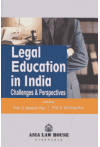- Author(s): Prof. G. Manoher Rao, Prof. K. Shrinivas Rao
- Publisher: Asia Law House
- Edition: 1 Ed Rp 2017
- ISBN 13 9789386416056
- Approx. Pages 304 + Contents
- Format Paperback
- Approx. Product Size 24 x 16 cms
- Delivery Time 3-5 working days (within Kerala & South India) (Others 7-9 days)
- Shipping Charge Extra (see Shopping Cart)
............................................................................................................................
Description
In this modern rapid developing society, the importance of providing legal education to everybody needs no emphasis. The role of the Lawyers in the society is not confined in arguing cases in the courts, but it extends to moulding public opinion and advising the society on various social and economic issues. The Rule of Law has changed from the ancient dispute-solving approach to socially-relevant approach. Thus, the object of legal education cannot be restricted only to producing legal practitioners who are experts in litigation - oriented skills but also to play a vital role in which the lawyers are equipped with divergent skills, perspectives and tools with a view to making them policy-makers, administrators and social engineers. The proposed divergent objective requires a different approach in the content and methodology of providing legal education. "Legal Education has a very crucial role to play in development of the law as hermeneutical profession, since it is an educational process which equips a future lawyer, judge, administrator, counselor and legal scientist to fashion and refashion ways of peaceful and ordered attainment of ideals of human governance on the one hand and democratic right on the other." (see, Report on Curriculum Development Centre in Law Vol. 1 UGC, New Delhi 1990 P. 16) The law colleges and schools must develop the professional approach through their faculty. Well- trained and well - equipped Law Teachers play very important role in moulding the future lawyers who are sure to be aware of their professional responsibilities. Hence, developing good teaching materials is a further challenge to legal education as the present text books and reading materials cannot provide sound foundation for a good lawyer. A related concern is that even if legal education can have some effect on student-attitudes, it will have little impact on their later practice.
............................................................................................................................
Contents
• Preface
• About the Institution
• Inaugural Address
LEGAL EDUCATION - CHALLENGES AND
PERSPECTIVES IN A GLOBALIZED WORLD
• LEGAL EDUCATION IN INDIA CHALLENGES
& PERSPECTIVES
KEY NOTE ADDRESS
1. LEGAL EDUCATION IN INDIA - CONTEMPORARY CONSPECTUS
ESTABLISHMENT OF LAW COLLEGES -NORMS & STANDARDS
2. STATUTORY MECHANISM TO REGULATE LEGAL EDUCATION: RELEVANCE OF 184th
REPORT OF THE LAW COMMISSION OF INDIA
3. LEGAL EDUCATION - AN ESSENTIAL COMPONENT OF THE KNOWLEDGE SOCIETY
4. ESTABLISHMENT OF LAW COLLEGES -MAINTENANCE OF STANDARDS OF LEGAL
EDUCATION - ROLE OF VARIOUS AGENCIES
5. STANDARDS OF LEGAL EDUCATION, PROFESSIONAL COMPETENCE AND SOCIAL
RESPONSIBILITY - A CRITIQUE WITH SPECIAL REFERENCE TO 184th REPORT OF
LAW COMMISSION OF INDIA
6. ACADEMIC REFORMS IN LEGAL EDUCATION AND THE ROLE OF UNIVERSITIES AND
BAR COUNCIL OF INDIA
7. MUCH ADO FOR NOTHING - A LEGAL MESS
8. THE INDIAN LEGAL EDUCATION AND PROSPECTIVES
9. LEGAL EDUCATION WITH REFERENCE TO THE ROLE OF BAR
COUNCIL OF INDIA
10. DENIAL OF PART TIME LEGAL EDUCATION TO EMPLOYEES NEEDS JUSTIFICATION
BY REVIVAL
TEACHING TECHNIQUES -EVALUATION
11. LAW TEACHING METHODS AND TECHNIQUES:
A CRITIQUE WITH SPECIAL REFERENCE TO INDIA
12. CLINICAL LEGAL EDUCATION AND LAW SCHOOLS IN INDIA - SOME
PROBLEMS AND REMIDIES
13. ROLE OF LAW TEACHERS FOR BETTER LEGAL EDUCATION AND
INTELLECTUAL ADVANCEMENT
14. TEACHING AND LEARNING FROM CLINICAL
EXPERIENCES: TEACHING A DOMESTIC VIOLENCE CLINIC
15. LEGAL EDUCATION FROM THE SOCIOLOGICAL PERSPECTIVE
16. LEGAL EDUCATION AND SOCIAL EMPOWERMENT
17. LEGAL EDUCATION - CHALLENGES AND SUGGESTIONS
18. CLINICAL LEGAL EDUCATION - STEPS TO ORGANISATION AND OPERATION
OF A IDEAL LAW SCHOOL CLINIC
19. TEACHING TECHNIQUES - EVALUATION
20. TEACHING TECHNIQUES IN
LEGAL EDUCATION - A CRITICAL EVALUATION IN THE LIGHT OF CHANGING SOCIAL SCENARIO
21. A NOBLE PROFESSION WHICH NEEDS AN ABLE FOUNDATION
22. INSIGHTS INTO LEGAL EDUCATION
COURSE CURRICULUM -NEW APPROACH
23. LEGAL EDUCATION, CHALLENGES AND PERSPECTIVES
24. LEGAL EDUCATION - NEW CHALLENGES
25. INDIAN LEGAL EDUCATION - CHALLENGES IN A LIBERALISED WORLD
26. THE IMPORTANCE OF LEGAL EDUCATION -A SINE QUA NON
FOR DEMOCRACY AND RULE OF LAW
27. LEGAL EDUCATION AND CYBER CONNECTION
28. NEED TO RESTRUCTURE THE CURRICULUM -WITH REFERENCE TO 3 YEAR LAW COURSE
29. THE ROLE OF THE BAR COUNCIL IN PRACTICAL TRAINING
30. ACCESS TO QUALITY LEGAL EDUCATION : CHANGING TIMES AND CHALLENGES
31. LEGAL EDUCATION, CHALLENGES AND PERSPECTIVE - AN OVERVIEW
32. CURRICULUM REFORM IN LEGAL EDUCATION FOR PROFESSIONAL EXCELLENCE,
CRITICAL UNDERSTANDING AND BETTER SOCIAL RESPONSIBILITY
33. IMPORTANCE OF EDUCATION IN GENERAL AND LEGAL EDUCATION IN PARTICULAR
ANNEXURE
The Legal Education & Professional Training and Proposals for Amendments to the
Advocates Act, 1961 and the University Grants Commission Act, 1956
Summary of Recommendations
............................................................................................................................

